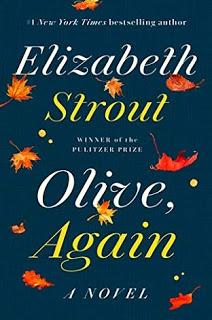
Published 15 October 2019.
Elizabeth Strout has extended Olive Kitteridge's life into another novel, Olive, Again (2019), and I am delighted.True to her character, Olive is cranky, cynical, and outspoken. She also displays compassion for people in her odd little way.
Her adventures move her and her associates into late life with many of its challenges:
loneliness, the oddities of remarriage in late life, the complexities of decades' long marriages, the conflict between expectations and realities, dealing with hardships such as depression, illness, infidelities, and such.
As with Olive Kitteridge, some of the chapters focus on other residents of Crosby, Maine--some of whom are much younger than Olive. There are a significant number of characters in their teens, 20s and 30s.
If any age group gets slighted, it's children. They aren't depicted in a robust way in this novel. Christopher's three younger children are largely silent or just make token appearances. However, many older characters discuss how events from their childhood continue to shape them.
Some of the most salient moments from this novel include the many times that people end up offering each other comfort and kindness even though they don't have a lot in common or they only have a tenuous connection. Almost everyone is carrying a heavy burden, and most people feel alone and overwhelmed. Nevertheless, there are moments of hope and grace that emerge from the pages of the book.
As a gerontologist, I was happy to see many of the characters as people in their 60s, 70s and 80s--people who were still capable of growth and development.
Related:
Olive Kittridge: Book Review
Books about Aging

